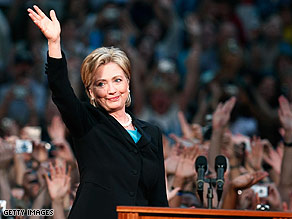This is a piece I wrote shortly after Barack H. Obama, the 44th President of the United States,
had effectively secured the Democratic Primary nomination in a very competitive contest against
fellow Democrat Hillary Clinton. Democratic white women in particular
were absolutely livid. Many had expressed a desire to "switch parties" and vote for the
Republican nominee, Sen. John McCain. This was months before Sen. McCain announced his
choice of running mate, Alaska Gov. Sarah L. Palin.
I wondered if these white women really were that bitter--that racist--that they would
vote for someone so diametrically opposed to their claimed beliefs, just to avoid
voting for a black man. Their raw
hatred, it seemed, for anything black and male was palpable.
Since Mr. Obama did win the Presidency in November of 2008, it seems that at least
some of these Democratic white women did eventually come to their senses and--at least
on Election day--not allow that racial hatred to dominate their voting. Sadly, even
now, years later, that anger--that racism--remains.




Democratic White Women and Barack Obama
by Terrell Prudé, Jr.
June 7, 2008
Updated October 4, 2008
Will Hillary Clinton Supporters Get Behind a Black Man?
That's really the question here.
Both Sen. Barack Obama and Sen. Hillary Clinton have repeatedly--and
correctly--pointed out that this year has been a historic one for
Presidential candidacy. Had either of them secured the Democratic
Party's nomination, it would've been the first time that a black person
of either sex or a woman of any color would've been the nominee of a
major political party.
In the end, it turned out to be a black person, specifically, a black man named Barack Obama.
A glass ceiling has indeed been shattered. Never again will
people be able to think, "you can only be President if you're
white." This is a time to celebrate! And you would think
that the vast majority of the Democratic Party would be doing just
that. Over the last 44 years, since the days of the Civil Rights
Act of 1964, the Democratic Party has held itself up as the "inclusive"
party, the party of "all Americans," much like Lincoln's Republican
Party of 143 years ago did. And they have several claims to back
that up.
However, we are seeing signs--even shouts--of anger, not celebration,
regarding the shaterring of this glass ceiling. Among the joy
of many Democrats, we are also seeing the fury of many other
Democrats. For this latter group, this is a time of bitter disappointment and
even a feeling of betrayal. We even heard many of them talking about changing
parties and voting for Sen. McCain, the Republican candidate, instead of
voting for Sen. Obama, a fellow Democrat. The rallying cry from them is, and I quote,
"Party Unity My Ass!"
What's going on here? Why this anger?
I've listened to the news reports, I've heard protesters, and I've
talked with plenty of folks around me, both before the Democratic Primary
and in the four months after. The conclusion
that I've come to is as follows:
White women are angry that a black man got the nod, and not another white woman.
But a glass ceiling has been shattered! Shouldn't all Democrats be
overjoyed that it's no longer solely a "white guy's club?" For
the answer to that, we must look at the demographics of Hillary Clinton
supporters. The two major demographics are Democratic, feminist,
white women; and so-called "white, working-class voters." Of
these two demographics, the former is certainly the larger.
Therefore, a look at the American feminist movement is in order.
The "Women's" Movement--Are Blacks Really Welcome?
Ever since the Democratic Primary vote in South Carolina, many of these
"mainstream" feminists
have asked, "why are over 90% of black women voting for Barack
Obama? Shouldn't they be voting for Hillary Clinton,
a fellow woman?"
It is easily arguable that
the voting patterns of black Americans, and black women in particular,
played a huge rule in Sen. Obama's Primary victory. The surprise--and
disappointment--among these feminists regarding these voting patterns
was palpable. They seemed to be totally,
utterly stunned by the results. The message was clear: "why aren't
black women allying themselves with us?"
I, too, noticed a distinct lack of enthusiasm among black women for the so-called
mainstream feminist movement, starting in the early 1990's. So, back then I
started asking black women why that was the case. The answer can
be summed up in the response by one receptionist I knew, a black woman:
"Feminism would be great, if only it included us."
Sadly, "feminism" has not
included black women. Oh, there are a few exceptions like Maya
Angelou, sure. But where is the backing of black female
candidates for high office?
For that matter, where is the feminist celebration when any
glass ceiling gets broken? Black Americans were the initiators of the Civil Rights Movement. People like A. Philip
Randolph, Martin Luther King Jr., Harriet Tubman, and Madame C. J.
Walker, among many others, are why we have a Civil Rights
Movement. Since white women, too, have faced discrimination,
would they not be overjoyed to see any
ceiling shattered? Wouldn't they be shouting, "right on,
brother/sister!" with the same enthusiasm that, say, Oprah Winfrey has?
The feminist movement has claimed to be a "women's movement" ever since
its inception. However, such is not the case;
it is not, in fact, a "women's movement." Rather, it is a white
women's movement. It has simply failed to
back its darker-hued sisters. "Mainstream" feminists over the
years have ignored and even ridiculed darker-skinned women, especially
black American women.
Reciprocal Backing
During and after the Democratic primary race, I've kept a close eye on the
major news channels, ever since the first caucus in Iowa.
One of the recurring themes would be a Clinton supporter
(usually white and female) versus an Obama supporter (usually black,
either sex). This started happening a lot after Obama's famous
"string of wins" in states with relatively large black American
populations. The question would usually get posed, "why are black
women voting race instead of gender?" The answer usually went
along the lines of "white women want black women to support them in
issues of gender, but they won't support black women in issues of race."
Since I live in a suburb of Washington, DC--a city affectionately
nicknamed "Chocolate City" due to its majority black American
population--I was able to ask questions of several blacks, both men and
women. For the men, it was obvious and expected: "a brother
actually has a chance this time, I'm backin' the brother." For
the women, the answer wasn't surprising, but it was telling.
Their response, in a nutshell, was, "I face a lot more discrimination
for being black than I do for being a woman. White women have it
way better even than black men. They don't get pulled over for
'Driving While Black.' But my brother/uncle/father did."
The other thing I heard from the black women that I spoke with was a resentment toward
white women generally, and they nearly
universally saw Mrs. Clinton as a symbol of why that resentment exists.
"Why should I vote for my enemy?" they would ask. It is important
to remember here the frustration that the black woman has felt in terms
of desirability to the opposite sex, compared to her white
sisters. A quick look at nearly any "mainstream" fashion magazine
will illustrate the issue at hand and is a major reason why Ebony
Fashion Fair came to exist. Historically, white women have been
considered, and indeed overtly or unconciously consider themselves, better looking than black
women.
"Sieg Heil," NOW?
There is a fundamental thoughtlessness, I have found, on the part of
white American feminists with regard to the experience of women of
color. One time, it even involved that universal symbol of hate,
the swastika.
I remember a time in college when a new chapter of the National
Organization for Women (NOW) was being formed on my campus. I
found out about it from a flyer, a copy of which was posted on
virtually every bulletin board and telephone pole within a quarter of a
mile of the campus, which is typical of any new organization announcing itself. What I found distinctly not typical
was the appearance of a swastika on those flyers. Below this
symbol of hate were the words, "Be a Femi-Nazi!" which I,
being part black and Native American, took to be highly
offensive. I wondered just what kind of people could embrace that
hateful icon.
There was no better way to answer that question than to meet those people
face to face. So, I went to the NOW meeting to do just that.
When I got there, I surveyed the population in the room. Every
woman in that room was white...and most were blonde. Given the
ad, I wasn't surprised. Furthermore, when they became aware of my
presence, the looks directed toward me were indeed hostile, in the way
of, "what are you doing here?" No welcoming feeling at all. My work complete, I left.
Later that year, I learned that the term "femi-nazi" and the swastika
were both a reference to something that conservative radio commentator
Rush Limbaugh said on his radio show. I hadn't yet heard Mr.
Limbaugh's program, so I was unaware of this. But nonetheless,
using a swastika in a positive way to refer to your supposedly
civil-rights-oriented organization is, at a minimum, thoughtless and
inexcusable. I found it interesting that this swastika-using
group was as unwelcoming to me as a man of color as they were to women
of color.
The "Year of the Woman"
In 1992, there was a big push for female candidates for the
House and Senate. That year was billed as "the year of the
woman." And, indeed, several women did get elected to positions
in the US legislature. Among them were Barbara Boxer, Dianne
Feinstein, Maria Cantwell, and Patty Murray, all US Senators.
Celebrities like the actress Meredith Baxter were backing these female
candidates, as were many other feminists and feminist sympathizers.
I noticed one glaring absence, and that was the utter lack of
minorities, and especially blacks, in the news about the female
candidates
running. And it's not that they didn't exist. Sen. Carol
Moseley Braun ran in 1992, and there was an occasional article about
her immediately after she was elected. However, the feminist
organizations said precious little about her campaign, but they could
be heard loud and clear about the campaigns of Boxer, Feinstein,
Murray, and other white women. This is despite the fact that Sen.
Braun was the first ever female senator--of any color--from Illinois,
and also the first black Democratic senator of either sex. When
she ended up embroiled in a financial scandal arguably not of
her making, feminist rallying to Sen. Braun's defense was
noticeably absent, unlike for Sen. Cantwell when she was under
financial duress in those same 1990's.
Even today, in 2008, white Democratic women are showing political disdain of
their black sisters. As previously mentioned, since June, many of them have
been seriously considering voting for Sen. McCain, the Republican candidate.
They explain this as an act of "gender solidarity" specifically to protest
the fact that Sen. Clinton did not get the nod. But if that were true--
if this really were a "protest vote" as they claim--then why did they not instead
threaten to vote for Cynthia McKinney, the Green Party's Presidential
candidate? She is a feminist, she is a liberal/progressive, she is even
a former Democrat...and she is a woman. So why are these
white Democratic women rallying around Sen. McCain, but not Ms. McKinney?
Could it have
anything to do with the fact that Ms. McKinney...is black?
Coverage of Injured Soldiers
Further recent evidence of white feminist racism, conscious or otherwise,
can be found with the now infamous
Pvt. Jessica Lynch story. As we all know, Pvt. Lynch was
captured, along with other Army soldiers, in Iraq. Among
them was another female soldier, Sgt. Shoshanna Johnson, who also
sustained severe injury. Coverage of Lynch was widespread and
international. She was offered a book deal and got interviewed by
Diane Sawyer.
My question: where was Diane Sawyer for Shoshanna Johnson?
But What About Hispanics?
Since the year 2000, when the US Census showed Hispanics to make up roughly 13%
of the national population, politicians have been doing virtually
everything that they can to woo "the Hispanic vote." Feminist activists, too, are strongly pursuing Hispanic
women. It is their right to do so.
But in the 143 years since the end of slavery, why were they not
pursuing black women? Why aren't they today? Why weren't
they even 10 years ago?
Sojourner Truth's poignant question, "ain't I a woman?" remains sung
out in the hearts of black American women yet today.
This is an important point worth emphasizing.
It's been 157 years since she originally asked that question, and
it is still being asked.
What's up, white women? Do you really still consider your black sisters
"not really women?" After all this, do you seriously have trouble
imagining why black women "voted race" this time? If your answer
still remains "yes", then please email me; I've gotta hear this.
The Question I Pose to White Democratic Women
Shortly after Sen. Obama's official acceptance of the Democratic Party
nomination in August 2008, Sen. McCain announced his pick for Vice
Presidential running mate. That pick was Alaska Gov. Sarah Palin, a white
woman. This would appear to give Democratic white women a "guilt-free"
way to change parties and vote Republican as an act of "gender solidarity,"
even though Sen. McCain's policies are nearly diametrically opposed to those
of virtually all Democrats. It's essentially a get-out-of-jail-free card
for them to "vote white."
Here, now, is the question that I will pose to you, the Democratic,
American white woman. Will you--finally--look past race and start
cheering the destruction of a glass ceiling? Will you vote for
someone who is more aligned with your beliefs, even though he's a
"nigger boy", as I've heard some say? Will you at last look past that, or will you follow
in the steps of your forebears who would never, ever vote for anything
black?
* Personal note: I am a mixed-race American man of Norwegian, Danish,
Black
(Malian), Cherokee, and Irish decent...to my knowledge. There may
be, and probably is, even more there.
Copyright (C) 2008, 2009 Terrell Prude', Jr. All rights reserved.
Return to homepage















